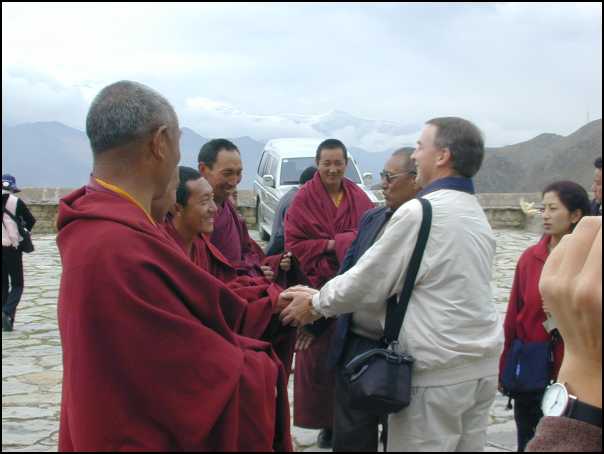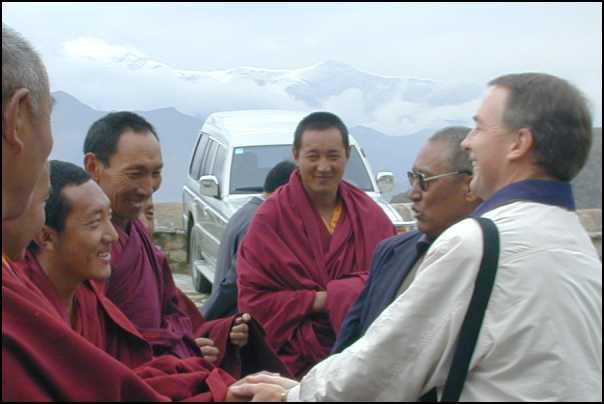Image: Goff Raises Human Rights Concerns in Tibet
Hon Phil Goff
Minister of Foreign Affairs and Trade
Media Statement
4 June 2001
Goff Raises Human Rights Concerns in Tibet

Close up...

Caption: NZ Foreign Minister
Phil Goff Meets Monks
At Dreprung Monastery in Lhasa,
Tibet.
Foreign Affairs Minister Phil Goff has completed his four-day visit to the Tibet Autonomous Region (TAR) having raise long-standing concerns held by New Zealand and much of the international community regarding human rights issues.
Like the international community, and the Dalai Lama himself, New Zealand does not challenge Chinese sovereignty over Tibet.
"What we have raised is concern over restriction on human rights such as freedom of speech and the harsh treatment of dissidents, restrictions on religion, and the need for greater autonomy to ensure the protection of Tibetan culture and language.
"During our stay in Tibet we took up these issues repeatedly while also being ready to hear and acknowledge advances that have been made by the Central Government in economic and social conditions over recent decades.
"A positive feature was that political leaders and officials were prepared to debate these issues. At one time the issues would not have been allowed on the agenda at all.
"I expressed my strong concern over sentences imposed on a number of political dissidents. The cases I raised were of monks and nuns who were not terrorists but who had simply peacefully expressed their support for independence. In our view, long prison sentences for peaceful expression of a political viewpoint is contrary to international human rights standards.
"While I did not receive permission to visit the inmates, authorities undertook to report on the condition of the four individual cases I raised and also to explain the circumstances of the recent deaths in custody of two political prisoners.
"Raising these issues highlights international concern about the plight of such prisoners and reminds China that the situation of prisoners of conscience is being kept under close scrutiny.
"On the question of freedom of religion, there is no doubt that Tibetan people are freely able to follow their religion. But while religious expression is not suppressed it is tightly controlled. For example, limits have been placed on the number of monks allowed in monasteries, and monks and nuns regarded as 'unpatriotic' have been removed from monasteries.
"We urged China to resume dialogue with the Dalai Lama and I sought information on the Dalai Lama-appointed Panchen Lama missing since 1995. We asked that he be allowed visits to back up assurances as to his well being.
"On the question of autonomy, we acknowledged
the undoubted effort that the
Central Government was
making in supporting economic and social development with
average expenditure around US$400 million a year. We also
noted that China's constitution and laws also provide
protection for minority ethnic groups. However, we urged
that greater autonomy be given to the TAR so that local
people could control their own destiny and promote their
cultural identity. This would provide Tibetans with the
ability to better regulate the impact on their culture of
modernisation and movement of people from inland
China.
"The outside world cannot compel China to make the changes we think are desirable. However, the opening up of dialogue allows New Zealand and other members of the international community to press and to encourage China to address the issues of human rights concerns," said Mr Goff.
ENDS


 Gordon Campbell: On Surviving Trump’s Trip To La La Land
Gordon Campbell: On Surviving Trump’s Trip To La La Land Greenpeace: Greenpeace Slams PM’s Science Pick - 'Polluters Are Running The Show'
Greenpeace: Greenpeace Slams PM’s Science Pick - 'Polluters Are Running The Show' NZ Government: PM’s Science Prizes Celebrate Excellence
NZ Government: PM’s Science Prizes Celebrate Excellence Department of Conservation: Pinnacles Hut, Summit Track Set For Improvement
Department of Conservation: Pinnacles Hut, Summit Track Set For Improvement  Tax Justice Aotearoa: New Report Illustrates Tax System Failures
Tax Justice Aotearoa: New Report Illustrates Tax System Failures PSA: PSA Welcomes Increased Defence Spend On Civilian Salaries
PSA: PSA Welcomes Increased Defence Spend On Civilian Salaries New Zealand Government: New Helicopters A Commitment To Global Security
New Zealand Government: New Helicopters A Commitment To Global Security


